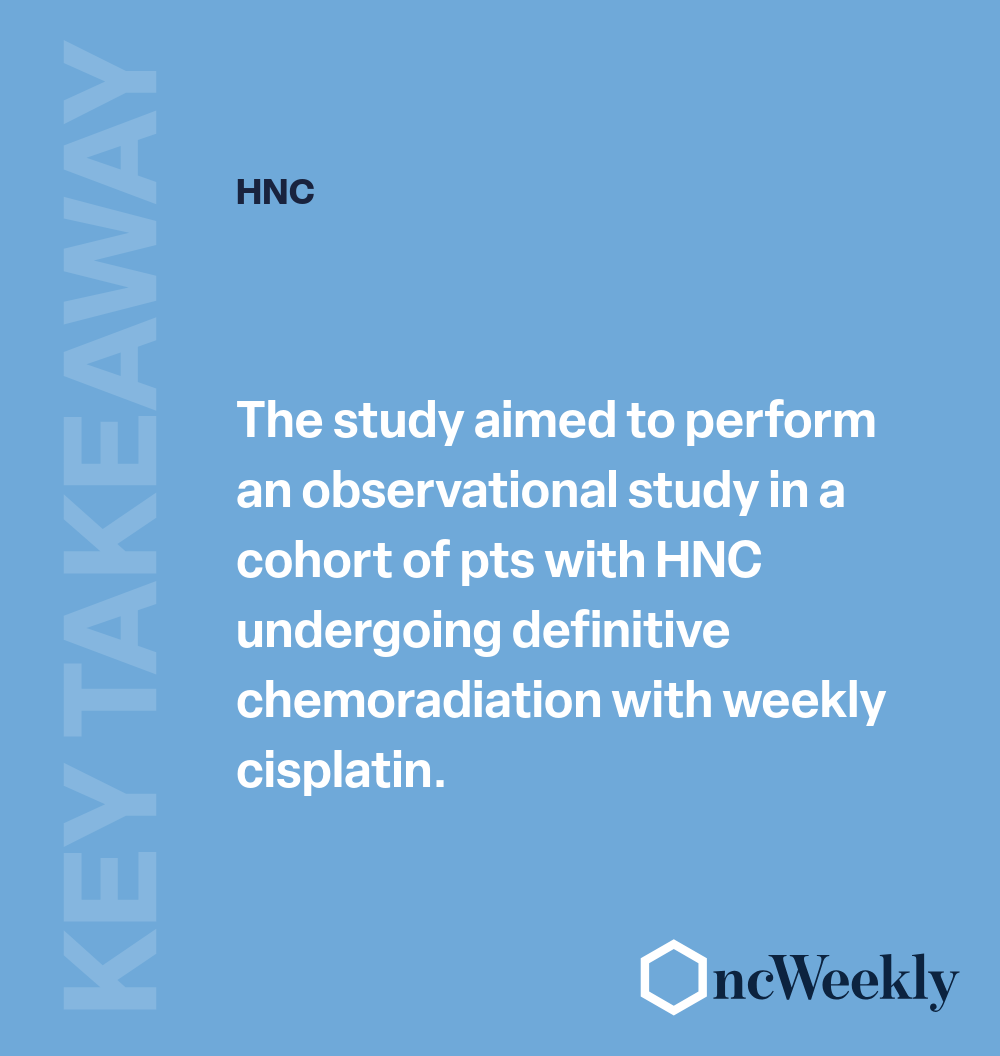KEY TAKEAWAYS
- The study aimed to perform an observational study in a cohort of pts with HNC undergoing definitive chemoradiation with weekly cisplatin.
- The key outcomes of the study were to evaluate OS and PFS.
- Researchers observed that low cisplatin adherence was linked to worse survival and poor performance status in HNC; further investigation is ongoing.
The use of cisplatin is recommended at weekly intervals as per the national comprehensive cancer network (NCCN) guidelines for patients (pts) with head and neck cancer (HNC) undergoing definitive chemoradiation.
However, in a recent phase III clinical trial (ConCERT), there was no conclusive evidence regarding a clear association between between the low adherence to weekly cisplatin and cancer control outcomes, as about 20% of pts treated with weekly cisplatin could not receive a total of 200 mg/m2.
Jas Virk and the team aimed to perform an observational cohort study of pts with HNC undergoing definitive chemoradiation with weekly cisplatin.
Researchers queried their institutional database to obtain data corresponding to non-metastatic HNC pts being treated with definitive chemoradiation with weekly cisplatin (40 mg/m²) from November 2007 to April 2023. Receiving at least 5 cycles with a total cumulative dose of 200 mg/m² was defined as adherence to weekly cisplatin.
Kaplan-Meier method, log-rank tests, and Cox proportional hazard multivariable (MVA) were employed for survival outcome analyses. To further identify variables associated with low adherence to weekly cisplatin the logistic MVA was conducted and fine-gray MVA was performed to assess failure outcomes considering death as a competing event.
Of 119 pts meeting the inclusion criteria, 51 pts (42.9%) had low adherence to weekly cisplatin. The median duration for follow-up was 19.8 months (interquartile range 8.8-65.6). They observed that the low adherence to weekly cisplatin was linked to worse overall survival (OS) (adjustedHR] 2.94, 95% confidence interval [CI] 1.58-5.47, P< 0.001) and progression-free survival (PFS) (aHR 2.32, 95% CI 1.29-4.17, P = 0.005).
Additionally, it was thought to be associated with worse distant failure (aHR 4.55, 95% CI 1.19-17.3, P= 0.03), but not locoregional failure (aHR 1.61, 95% CI 0.46-5.58, P= 0.46). The only variable associated with low adherence to weekly cisplatin (adjusted odds ratio [aOR] 2.67, 95% CI 1.10-6.65, P= 0.03) was the KPS < 90.
The study concluded that more than 40% of pts underwent even less than 5 weekly cisplatin cycles and that low adherence to weekly cisplatin was an independent, adverse prognostic factor for worse survival and distant failure outcomes.
Those pts who experienced low adherence to weekly cisplatin tended to demonstrate poor performance status. Further studies are suggested to enhance its adherence to chemotherapy and outcomes.
The study was supported by the National Cancer Institute Cancer Center Support Grant (P30CA016056).
Source: https://pubmed.ncbi.nlm.nih.gov/39003442/
Virk J, Gill J, Fekrmandi F, et al. (2024). “Association of low adherence to weekly cisplatin with outcomes in patients with head and neck squamous cell carcinoma: a retrospective cohort study. BMC Cancer.” 2024 Jul 13;24(1):838. doi: 10.1186/s12885-024-12615-w. PMID: 39003442; PMCID: PMC11245783.





